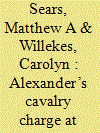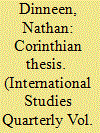|
|
|
Sort Order |
|
|
|
Items / Page
|
|
|
|
|
|
|
| Srl | Item |
| 1 |
ID:
148640


|
|
|
|
|
| Summary/Abstract |
The Battle of Chaeronea, fought in 338 BCE between Philip of Macedon and the Greek city-states, is known only from meager literary evidence and a few archaeological finds. For decades, scholars had reconstructed the battle to include a cavalry charge led by Philip’s eighteen-year-old son, the future Alexander the Great. More recently, this cavalry charge has been called into question, primarily because of the supposed maxim that cavalry will not trample disciplined infantry. A reconsideration of the evidence, however, including skeletal remains from the battle and studies of equine behavior, suggests that Alexander’s charge was feasible.
|
|
|
|
|
|
|
|
|
|
|
|
|
|
|
|
| 2 |
ID:
163282


|
|
|
|
|
| Summary/Abstract |
David Hume famously argued that the idea of the balance of power existed in antiquity. However, he rests his case almost entirely on the deeds of the ancient Greeks. This evidence, by itself, only shows that balance of powers emerged as an outcome of competitive Greeks warring with each other for power and prestige. It does not demonstrate the existence of the balance of power as a social convention of the inter-polis society or as a goal of a regime's foreign policy. I argue that a focus on the speeches in the political histories of Herodotus, Thucydides, and Xenophon bears out his claim. Attention to these speeches rebuts Hume's main critics of the last century—that is, international relations scholars belonging to the English School. In particular, the speeches of the Corinthians from prior to the Persian Wars to the aftermath of the Peloponnesian War reveal an enduring thesis of their foreign policy: that imperial ambitions and leveling tendencies, such as those of Athens, Sparta, and Thebes, should be countered in order to prevent a tyrant city from emerging within the society of Greek city-states.
|
|
|
|
|
|
|
|
|
|
|
|
|
|
|
|
|
|
|
|
|